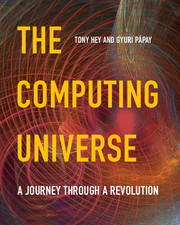Book contents
- Frontmatter
- Contents
- Preface
- A quick tour through the book
- Acknowledgments
- Prologue: Blog entry from Jonathan Hey
- 1 Beginnings of a revolution
- 2 The hardware
- 3 The software is in the holes
- 4 Programming languages and software engineering
- 5 Algorithmics
- 6 Mr. Turing’s amazing machines
- 7 Moore’s law and the silicon revolution
- 8 Computing gets personal
- 9 Computer games
- 10 Licklider’s Intergalactic Computer Network
- 11 Weaving the World Wide Web
- 12 The dark side of the web
- 13 Artificial intelligence and neural networks
- 14 Machine learning and natural language processing
- 15 The end of Moore’s law
- 16 The third age of computing
- 17 Computers and science fiction – an essay
- Epilogue: From Turing’s padlocked mug to the present day
- Appendix 1 Length scales
- Appendix 2 Computer science research and the information technology industry
- How to read this book
- Notes
- Suggested reading
- Figure credits
- Name index
- General index
- References
Suggested reading
Published online by Cambridge University Press: 05 December 2014
- Frontmatter
- Contents
- Preface
- A quick tour through the book
- Acknowledgments
- Prologue: Blog entry from Jonathan Hey
- 1 Beginnings of a revolution
- 2 The hardware
- 3 The software is in the holes
- 4 Programming languages and software engineering
- 5 Algorithmics
- 6 Mr. Turing’s amazing machines
- 7 Moore’s law and the silicon revolution
- 8 Computing gets personal
- 9 Computer games
- 10 Licklider’s Intergalactic Computer Network
- 11 Weaving the World Wide Web
- 12 The dark side of the web
- 13 Artificial intelligence and neural networks
- 14 Machine learning and natural language processing
- 15 The end of Moore’s law
- 16 The third age of computing
- 17 Computers and science fiction – an essay
- Epilogue: From Turing’s padlocked mug to the present day
- Appendix 1 Length scales
- Appendix 2 Computer science research and the information technology industry
- How to read this book
- Notes
- Suggested reading
- Figure credits
- Name index
- General index
- References
- Type
- Chapter
- Information
- The Computing UniverseA Journey through a Revolution, pp. 377 - 380Publisher: Cambridge University PressPrint publication year: 2014



